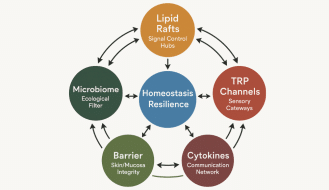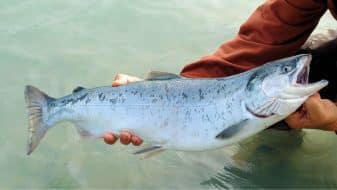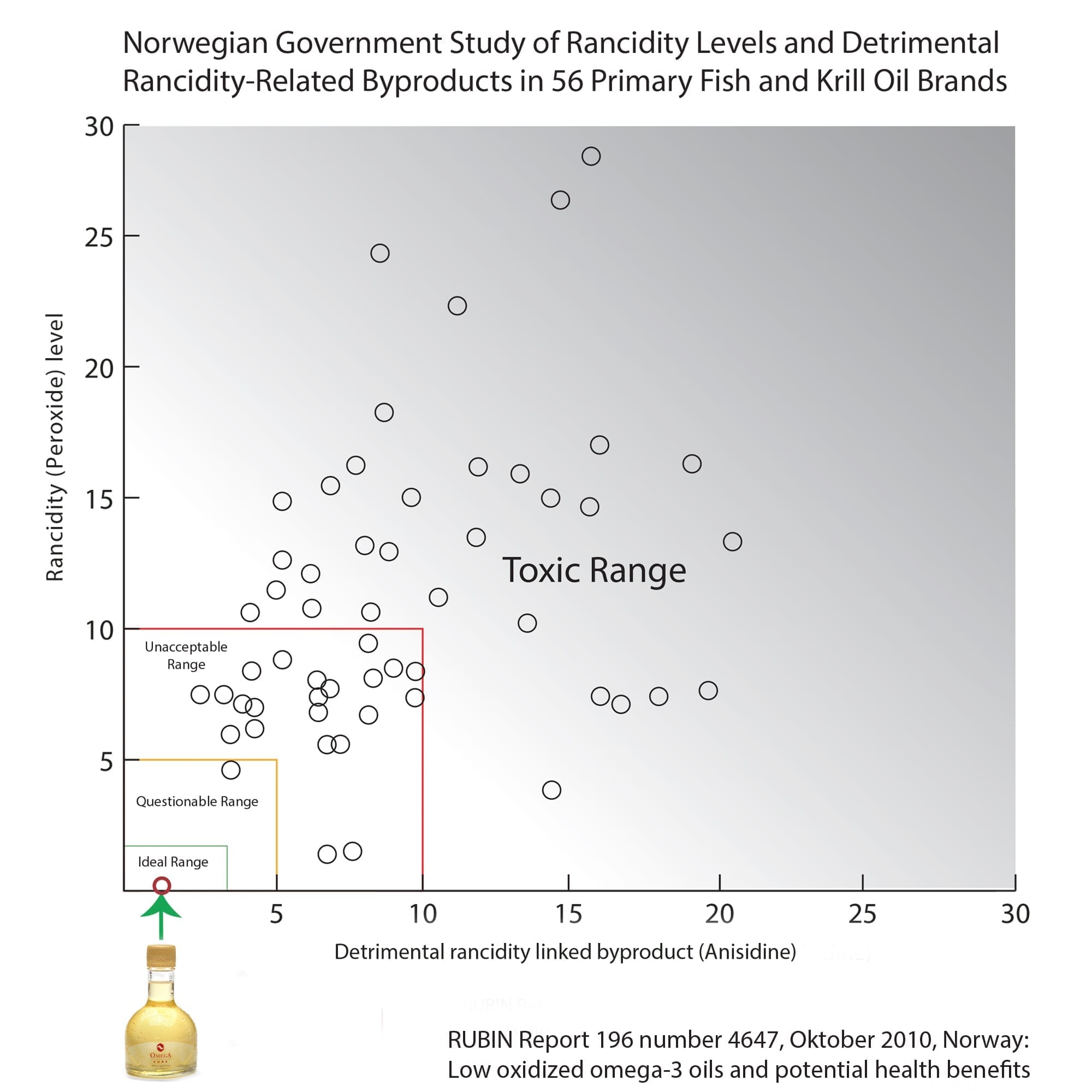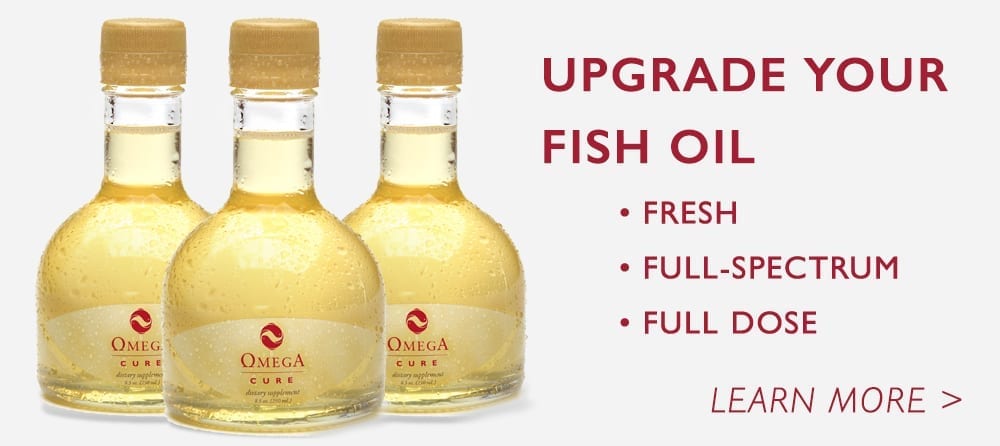Is There a Link Between Rancid Fish Oil and Prostate Cancer?
In 2013, a study from Ohio State University found that men with the highest amount of omega-3 fatty acids in their blood also had the highest risk of getting prostate cancer.
The national media craze that ensued created a lot of worry about fish oil. And five years later, we still get questions about whether omega-3 supplements are safe for men at risk of getting prostate cancer.
Here is what’s important to know about that Ohio State University study and the more recent findings on prostate cancer and omega-3s:
OSU Fish Oil Study Lands Them In Deep Water
After being published, the Ohio State University study received a wave of criticism from omega-3 research and academic communities for its poorly designed research protocol and hastily drawn conclusion.
The OSU researchers had only taken a blood sample of the male participants, and had then cranked the data to see if they could find statistically significant associations between different blood concentrations and common health risks. Looking at their data, the researchers had found numerous associations that made little sense — for instance, that smokers had a lower risk of developing prostate cancer than non-smokers.
But the relationship between higher blood values of omega-3s and prostate cancer caught the researchers’ attention and that of the media as well. Soon, publications like TIME Magazine were posting alarmist titles like, “Hold The Salmon: Omega-3 Fatty Acids Linked to Higher Risk of Cancer.”
Could Fish Oil Help Prevent or Treat Prostate Cancer?
Many researchers pointed out that these overblown findings contradicted numerous other studies, most of which had found that omega-3s help reduce the risk of developing cancer. An Australian review on omega-3 and cancer published earlier that year found that a daily dose of up to 3 grams of EPA/DHA per day had positive outcomes as an anti-cancer treatment, and worked as an effective adjunct to chemotherapy.
Furthermore, epidemiological data did not support the idea that omega-3s caused prostate cancer. Many people were quick to point out that Japanese men, who consume vast amounts of omega-3s from fish and fish oil supplements, also have among the lowest rates of prostate cancer in the world.
Since 2013, scientists have continued to explore the issue.
Numerous studies, particularly animal and in vitro cell studies, find that omega-3s help inhibit carcinogenesis and reduce prostate cancer risk. In addition, studies on patients with prostate cancer have found that increased omega-3 intake helps reduce the risk of cancer metastasis and the risk of dying from the disease.
But when it comes to observational studies on people, the results have been inconsistent in assessing whether omega-3s increase or decrease one’s risk of developing prostate cancer.
Considering Omega-3 Freshness Levels
Why are these studies contradictory? There could many factors at play, of course. But we believe that part of the answer has to do with a little-discussed, quality-related issue.
Some scientists have begun to voice their concern that rancid fish oil could explain why omega-3 studies are coming up with contradictory results. And this could certainly make sense when looking at the prostate cancer literature.
When writing their omega-3 studies, few researchers describe the freshness (or oxidation) levels of the oil used. This is a problem, since oxidation levels in omega-3 oils can vary by 100-fold. As the fatty acids oxidize, the molecular structure of these healthy fats starts to change and they instead release harmful byproducts.
The results from a Norwegian government-sponsored omega-3 study, which included Omega Cure® fish oil.
Rancid Fish Oil Likely Does More Harm Than Good
To date, we haven’t yet seen a study specifically showing that rancid fish oil causes prostate cancer. But the findings from a 2016 review from the University of Massachusetts, Amherst give reason to believe that may be the case. It concluded that when the omega-3 fatty acids turn rancid, the byproducts created have “a mutagenic and pro-inflammatory” effect, and could be linked with increased cancer risks.
In addition, other human trials have found that rancid fish oil had a negative impact on cholesterol levels, whereas fresh fish oil delivered the expected benefits.
These reports are especially concerning since independent surveys of omega-3 supplements around the world have found that the majority of products are rancid at the time of purchase.
Check Your Omega-3 Fish Oil at Home
Typically, rancid fish oils can be distinguished by their taste and odor. Omega-3s with the lowest oxidation values have no smell or taste. On the other end of the spectrum, omega-3s with the highest oxidation values often have a strong fishy taste and smell, usually concealed by a gelatin capsule or large amounts of flavoring.
For the consumer, performing the rancidity test is simple: Cut open the gel capsule. If the oil within smells or tastes fishy, it is likely rancid. Truly fresh fish oil has no fishy taste or smell.
Choose Fresh Fish Oil
There are many aspects of the Ohio State University study that don’t make sense. But the findings should remind fish oil consumers: Rancid fish oil has no place in human nutrition and we need to be aware of the quality of the omega-3s we put in our bodies.
On the other hand, removing pure, fresh fish and fish oil from our diets would be a health disaster, given the many potential benefits for people with joint issues, high triglycerides, dry eyes and cancer.
Omega Cure is the freshest fish oil in the world. We invite you to experience the difference for yourself.
1. Albert, Benjamin B. “Oxidation of Marine Omega-3 Supplements and Human Health.” BioMed Research International. Hindawi Publishing Corporation, 9 Apr. 2013.
2. Aucoin, M et al. “Fish-Derived Omega-3 Fatty Acids and Prostate Cancer: A Systematic Review.” Integrative Cancer Therapies. 2017 Mar;16(1):32-62. doi: 10.1177/1534735416656052.
3. Brasky, TM. “Result FiltePlasma Phospholipid Fatty Acids and Prostate Cancer Risk in the SELECT Trial.” Journal of the National Cancer Institute 2013 Aug 7;105(15):1132-41. doi: 10.1093/jnci/djt174.
4. Fu, Yuan-Qing et al. “Effect of Individual Omega-3 Fatty Acids on the Risk of Prostate Cancer: A Systematic Review and Dose-Response Meta-Analysis of Prospective Cohort Studies.” Journal of Epidemiology 25.4 (2015): 261–274. doi: 10.1186/s12944-017-0442-5.
5. Gray, Nathan. “Experts Slam Omega-3 Link to Prostate Cancer as Overblown ‘Scaremongering'” NutraIngredients.com. William Reed Business Media SAS, 12 July 2013.
6. Haas-Haseman, Marilyn. “Weighing the Benefits of Fish Oil for Patients With Prostate Cancer: A Subcohort Review From the SELECT Trial.” Journal of the Advanced Practitioner in Oncology 6.4 (2015): 376–378.
7. Küllenberg de Gaudry, D and Massing, U. “Importance of Long Chain Omega-3 Fatty Acids in Prostate Cancer.” Der Urologe, 2014 Nov;53(11):1620-4. doi: 10.1007/s00120-014-3612-3.
8. Liang P et al. “Effect of Dietary Omega-3 Fatty Acids on Tumor-Associated Macrophages and Prostate Cancer Progression.” Prostate. 2016 Oct;76(14):1293-302. doi: 10.1002/pros.23218.
9. Lysvold, Susanne. “Slår Alarm om Dårlige og Harske Produkter.” NRK. NRK, 22 Sept. 2010.
10. Vaughan, VC. “Marine Polyunsaturated Fatty Acids and Cancer Therapy.” British Journal of Cancer, 2013 Feb 19;108(3):486-92. doi: 10.1038/bjc.2012.586.
Popular posts



Related posts








